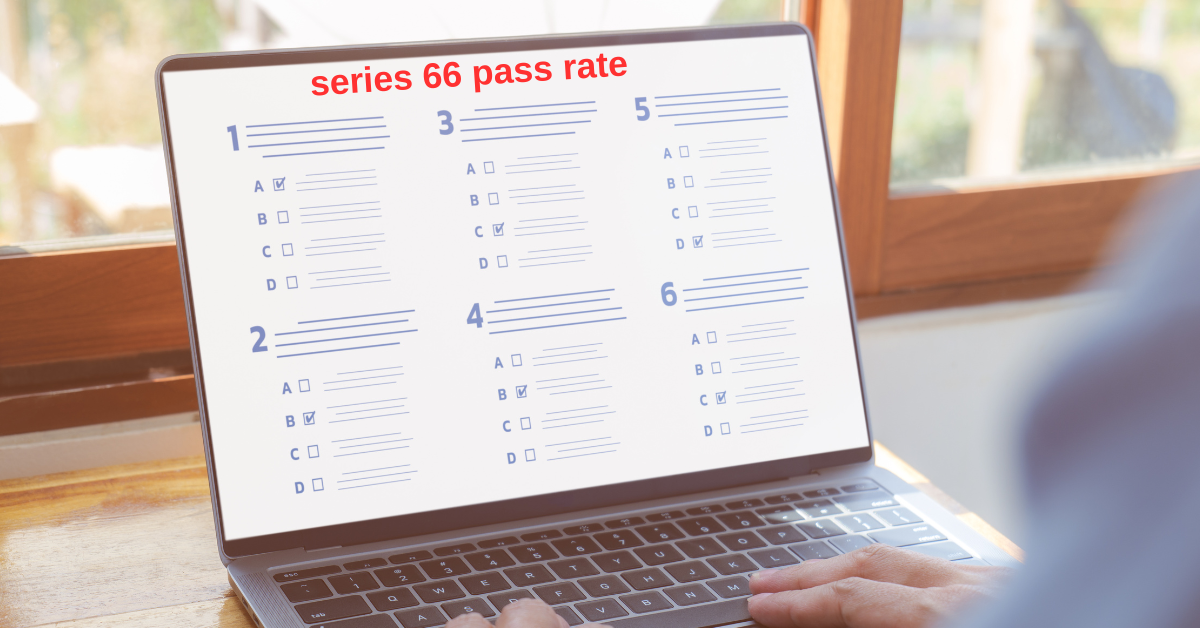The Series 66 exam is an important step for individuals looking to become licensed securities agents in the USA. This exam, also known as the Uniform Combined State Law Examination, is administered by the Financial Industry Regulatory Authority (FINRA) and is required for any individual who wants to become both a securities agent and an investment advisor. With the pass rate for this exam being a main factor in determining the success of any securities agent, it’s important to examine this blog post and the insights surrounding the Series 66 pass rate we have reviewed here.
What is the Series 66 Pass Rate?
Before diving into the insights and trends, it’s important to understand what the Series 66 pass rate is. The pass rate is the percentage of individuals who successfully passed the Series 66 exam on their first attempt. This rate is calculated by dividing the number of individuals who passed the exam by the total number of individuals who took the exam.
Key Insights
The Series 66 pass rate has been steadily increasing over the years, reaching 75% in 2019, a significant increase from 66% in 2015. This indicates that individuals are becoming better prepared for the exam and are more likely to pass on their first attempt, according to data from FINRA.
Who is required to take the Series 66 Exam?
Series 66 Exam Requirements in the US
• No Series 7 Qualification: Individuals without or planning to obtain a Series 7 qualification are required to take Series 66.
• Investment Advisory Representatives: Individuals wishing to register as investment adviser representatives and provide fee-based investment advice are required to take Series 66.
• Uniform Combined State Law Examination (UCSLE) Requirement: Series 66 includes the UCSLE portion, testing knowledge of state-specific securities laws and regulations.
• Individuals intending to operate in states requiring the UCSLE for registration must take the Series 66 examination.
Another important insight is that the pass rate for the Series 66 exam is higher than the pass rate for other securities exams, such as the Series 7 and Series 63 exams. This could be because the Series 66 exam combines the Series 63 and Series 65 exams, and individuals who have already past these exams may better understand the material.

Trends
One of the most notable trends surrounding the Series 66 pass rate is the correlation between education and the pass rate. According to FINRA data, individuals with a college degree have a higher pass rate (80%) compared to those without a college degree (70%). This trend suggests that having a strong educational background can greatly increase an individual’s chances of passing the Series 66 exam.
How the Series 66 Exam Fits into Your Career Goals as a Financial Professional
Series 66 Exam Benefits and Regulatory Compliance
• Expanded Services: Passing the Series 66 exam allows registration as a securities agent and investment adviser representative, expanding services.
• Comprehensive Qualification: The exam combines content from Series 63 and Series 65, demonstrating an understanding of state and federal securities laws and regulations.
• Meeting Regulatory Requirements: The exam helps meet state-specific regulatory requirements for investment adviser representatives.
• Enhanced Professional Credibility: Holding multiple licenses and registrations enhances professional credibility.
• Career Flexibility: The qualification offers career flexibility in various roles.
• Client Trust and Confidence: The qualification instills client confidence in the professional’s knowledge and regulatory approval.
• Pathway to Other Licenses: The Series 66 and Series 7 can open doors to other licenses and registrations.
• Regulatory Compliance: The exam ensures an understanding of rules and regulations governing securities transactions and investment advice.
Series 66 exam cost
Exam Registration Fees and Testing Center Fees
• FINRA charges a registration fee for the Series 66 exam, covering administrative costs.
• Prometric, the testing center administrator, charges a fee for the use of its facilities.
• Candidates often invest in study materials like textbooks, online courses, or review programs.
• Some candidates enroll in training programs or classes, which may have associated costs.
• Retake fees may apply if a candidate fails the exam on the first attempt, typically lower than the initial registration fee.
Differences between the Series 66 and Series 65 Exams
Series 66 and Series 65 Securities Licensing Exams Overview
• Series 66 is a combination of the Series 63 and Series 65 exams, qualifying individuals as both securities agents and investment adviser representatives.
• Series 65 focuses on the knowledge and skills required for individuals to become investment adviser representatives.
• Series 66 typically requires completion of the Series 7 exam, a general securities representative qualification exam.
• Series 65 can be taken as a standalone exam, commonly taken by individuals not intending to become general securities representatives but want to be registered as investment adviser representatives.
• Both exams have a passing score of 73%, with Series 65 exam having more questions and being weighted more heavily.
• Preparation materials for Series 66 are designed for both exams, while for Series 65, they are tailored to the investment adviser representative exam content.
Common Mistakes to Avoid on the Series 66 Exam
Exam Preparation Mistakes and Solutions
Underestimating State Securities Laws:
• Focus on studying state-specific securities laws.
• Dedicate sufficient time to studying state-specific content.
Neglecting Federal Securities Laws:
• fundamental federal securities laws and regulations.
• Familiarize yourself with the Securities Act of 1933, the Securities Exchange Act of 1934, and other key federal statutes.
Ignoring the Importance of Ethics
• Familiarize yourself with ethical guidelines, fiduciary responsibilities, and industry standards.
Not Practicing Enough with Sample Questions
• Spend enough time practicing with sample questions and practice exams.
Overlooking the Interplay Between Securities and Investment Adviser Regulations:
• Get the ideal interplay between securities regulations and investment adviser regulations.
Focusing solely on memorization:
•know underlying principles and concepts to apply knowledge to different scenarios.
Not Managing Time Effectively During the Exam:
• Avoid spending too much time on challenging questions.
Ignoring Changes in Regulatory Requirements:
• Stay updated on any changes to regulatory requirements and exam content.
Neglecting Your Physical and Mental Well-Being:
• Prioritize self-care during exam preparation.
(FAQs) about the Series 66 pass
- What is the pass rate for the Series 66 exam?
- Pass rates for the Series 66 exam can vary, but they generally fall in the range of 70-75%.
- Is the Series 66 pass rate the same for all test-takers?
- No, pass rates can differ based on various factors, including individual preparation, professional background, and experience.
- Do pass rates for the Series 66 exam vary by state?
- Pass rates may vary by state due to differences in the difficulty of state-specific questions and candidate demographics.
- What factors can influence the pass rate for the Series 66 exam?
- Factors such as study preparation, prior knowledge, test-taking skills, and the difficulty of exam questions can impact pass rates.
- Is there a difference in pass rates between first-time test-takers and those retaking the Series 66 exam?
- Pass rates often show a distinction, with first-time test-takers generally having higher pass rates compared to those retaking the exam.
- Are there historical trends in the Series 66 pass rate?
- Historical trends may show fluctuations, influenced by changes in exam content, candidate demographics, and regulatory updates.
- How does the pass rate for the Series 66 exam compare to other securities exams?
- Pass rates for the Series 66 may be similar to or slightly lower than other securities exams, such as the Series 7.
- Do candidates who take preparatory courses have higher pass rates on the Series 66 exam?
- Candidates who take preparatory courses often have higher pass rates due to structured study plans and access to comprehensive materials.
- What is the impact of changes in exam content on the pass rate?
- Changes in exam content can influence pass rates as candidates need to adapt their study strategies to new topics or regulations.
- Are there specific topics within the Series 66 exam that tend to have lower pass rates?
- Some candidates may find state-specific regulations and ethical considerations challenging, leading to lower pass rates in these areas.
- Is there a correlation between professional experience and success on the Series 66 exam?
- Professional experience can positively correlate with success on the Series 66 exam, as practical knowledge may aid in understanding regulatory concepts.
- Do candidates with a financial or legal background have higher pass rates?
- Candidates with financial or legal backgrounds often have higher pass rates due to their familiarity with relevant concepts and terminology.
- How often is the Series 66 exam pass rate updated or reported?
- Pass rate updates are typically released periodically, and the frequency may vary. Candidates can check regulatory websites for the latest statistics.
- Is the pass rate for the Series 66 exam different for self-study candidates compared to those in formal training programs?
- Pass rates may vary, but candidates using formal training programs often benefit from structured learning and guidance, potentially leading to higher pass rates.
- What resources are available to help candidates improve their chances of passing the Series 66 exam?
- Resources include study guides, online courses, practice exams, and review programs. Utilizing a combination of these resources can enhance preparation.
- Are there any statistics on pass rates for candidates who use practice exams as part of their preparation?
- Candidates who incorporate practice exams into their study routine often perform better, as these exams help simulate the actual testing environment.
- How does the pass rate for the Series 66 exam compare to the pass rate for the Series 7 exam?
- The Series 66 pass rate may be slightly lower than the Series 7 pass rate due to the additional complexity of state-specific regulations.
- Do pass rates vary for candidates who take the Series 66 as part of a combined exam (e.g., Series 7 and Series 66)?
- Pass rates for combined exams may depend on the candidate’s ability to master a broader range of content, but success is achievable with thorough preparation.
- Are there any demographic factors, such as age or educational background, that correlate with higher pass rates on the Series 66 exam?
- Demographic factors can influence pass rates, with candidates possessing advanced degrees or relevant industry experience often performing well.
- What steps can candidates take to improve their chances of passing the Series 66 exam on the first attempt?
- Effective study strategies, time management, utilizing multiple study resources, and taking practice exams are key steps to increase the likelihood of passing on the first attempt.
Conclusion
The Series 66 pass rate is a crucial factor for individuals aspiring to become licensed securities agents. With increasing pass rates and trends in education and age, it’s evident that individuals are becoming better prepared.
The pass rate isn’t the only determinant of success. Proper preparation and understanding of the material are also essential for passing the exam on the first attempt. Share your experiences with the pass rate in the comments.



